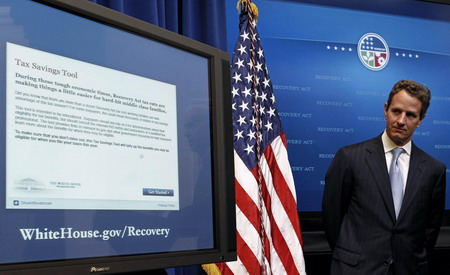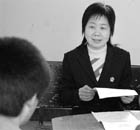Foreign and Military Affairs
US delays yuan report 'to prevent showdown'
By Qin Jize and Cheng Guangjin (China Daily)
Updated: 2010-04-05 08:47
 |
Large Medium Small |
|
 US Treasury Secretary Timothy Geithner looks at a screen referring to Recovery Act tax cuts at the Eisenhower Executive Office Building in Washington, March 22, 2010. [Agencies] |
BEIJING: US Treasury Secretary Timothy Geithner said on Saturday he was delaying an April 15 report on whether China manipulates its currency, amid growing debate on the revaluation of the yuan.
"A move by China to a more market-oriented exchange rate will make an essential contribution to global rebalancing," Geithner said in a statement.
He also pledged to press for a more flexible Chinese currency policy, following renewed US calls for China to revalue the yuan.
| ||||
But the country may start revaluing its currency as early as the second half of the year, with the move not "yielding to US pressure, but seeing to China's own needs", Jin Canrong, a leading US studies expert at the Renmin University of China, said on Sunday.
Still, Geithner said he will use upcoming meetings of the Group of 20 and a US-China economic summit in Beijing in May to try to advance the US position.
"I believe these meetings are the best avenue for advancing US interests at this time," Geithner said in a statement issued at midday on the Easter holiday weekend. The US Treasury gave no indication of when it will release the report.
The US Business and Industry Council, a trade group, said the administration will apparently delay the release of the report until after the G20 summit meeting in June.
The latest US decision to delay the report came as President Hu Jintao is scheduled to visit Washington next week to attend a nuclear security summit after both sides strived to patch up strained ties over Taiwan, Tibet and trade.
The New York Times reported earlier that the US Treasury's move seemed intended to send a reassuring message to China and the US Congress.
"It signaled to China that the administration prefers to resolve the dispute diplomati cally, rather than force a showdown, but also pressed the case for a change in China's policy, a position advocated by many US lawmakers in both parties," it said.
Lu Zhengwei, a senior economist at Industrial Bank, predicted that the time will come for China to appreciate its currency after the strained ties are eased, "which may be around May when the two sides hold the Strategic and Economic Dialogue", information portal Ifeng.com reported.
A declaration that China manipulated its currency can lead to sanctions if the nation refuses to yield by moving toward a more flexible currency rate.
A number of analysts also differed on the impact of a rising currency.
Zhang Ming, a researcher with the Chinese Academy of Social Sciences, said last week that the sooner the yuan exchange rate is made flexible, the more initiative China will have.
"It will benefit China in the long term to have its currency appreciate within a controllable scale, which will have only limited impact on exports and employment," Zhang said.
But British economist John Ross, a visiting professor with Shanghai Jiaotong University, told reporters that an appreciation of the yuan can lead to global inflation and lower the living standard of people in the US as well as other countries.
Now is not the best time for yuan revaluation but that will definitely happen in the next five years, Ross said.
The latest US move also shows that the country wants to prevent current friction from escalating into a trade war, Jin Canrong said.
The Obama administration now wants to "play the good guy" and the US Congress is likely to play the bad guy by passing a non-legally binding resolution against China, Jin said.
But the US will not give up using the currency issue to force China to open its markets, especially the financial market, he said.
Reuters contributed to the story
China Daily











